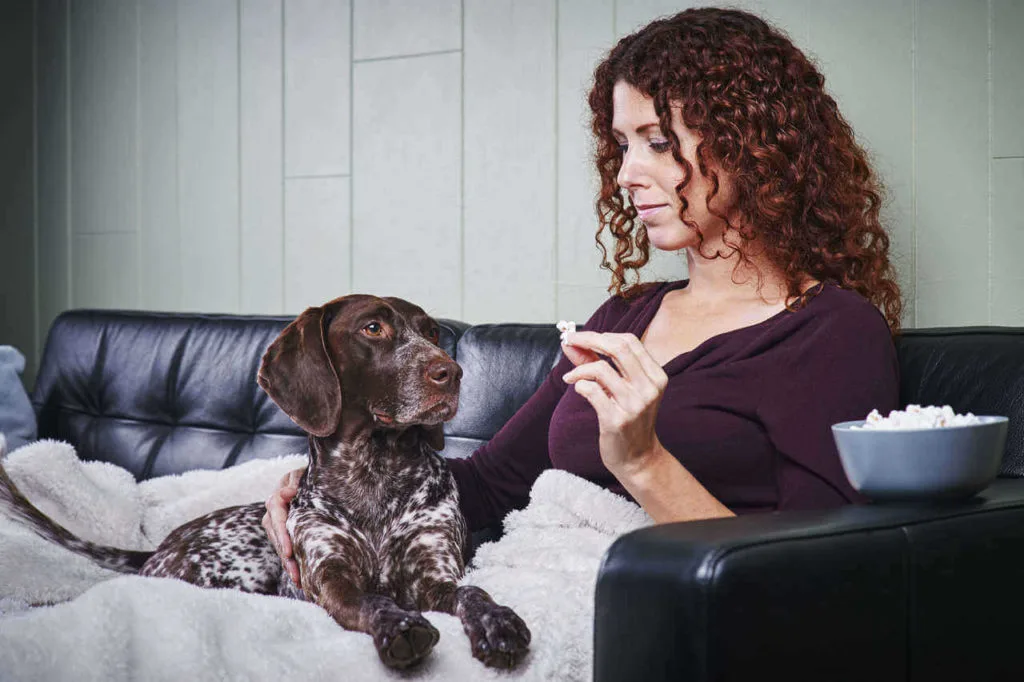Ever wondered whether it's safe to share your favorite movie snack with your furry friend? Can dogs have popcorn, or is it a big no-no? If you're anything like me, you've probably caught yourself sneaking a piece of popcorn to your dog during movie nights. But hold up—before you hand over that bowl, let's dive into the facts. Your dog’s health is important, and knowing what’s safe for them can make all the difference.
Popcorn has become one of the most beloved snacks worldwide, and who wouldn't want to share this buttery, salty goodness with their best friend? But here's the deal: while popcorn itself isn't inherently toxic to dogs, there are some important factors to consider before you start tossing kernels their way. Stick around, and we'll break it down for you.
In this article, we’ll cover everything you need to know about feeding popcorn to your dog, including the potential risks, benefits, and how to serve it safely. So grab a bowl (for yourself, not Fido), and let's get started!
Read also:Debra Puth The Rising Star Whorsquos Making Waves In Entertainment
Table of Contents
- Can Dogs Have Popcorn: The Basics
- Health Benefits of Popcorn for Dogs
- Potential Risks of Feeding Popcorn to Dogs
- Types of Popcorn: Which Ones Are Safe?
- How to Serve Popcorn Safely to Dogs
- How Much Popcorn Can Dogs Eat?
- Healthy Snack Alternatives for Dogs
- Frequently Asked Questions
- Sources and References
- Final Thoughts on Dogs and Popcorn
Can Dogs Have Popcorn: The Basics
First things first, let's talk about the basics. Popcorn is essentially a whole grain that expands when heated, creating those fluffy, delicious kernels we all love. But when it comes to dogs, can they really indulge in this tasty treat? The short answer is yes—but with some caveats.
Plain, air-popped popcorn is generally considered safe for dogs in moderation. However, the key here is "plain" and "air-popped." Many of the popcorn varieties available on store shelves are loaded with butter, salt, sugar, and other additives that can be harmful to your pup. So, if you're thinking of sharing your caramel popcorn with Fido, you might want to think again.
Let's break it down further in the sections below to help you understand what's safe and what's not.
Health Benefits of Popcorn for Dogs
Believe it or not, popcorn can actually offer some health benefits for dogs—if served correctly. Here are a few reasons why popcorn might be a good snack for your furry friend:
- Fiber-Rich: Popcorn is a great source of dietary fiber, which can aid in digestion and promote a healthy gut for your dog.
- Low in Calories: Plain popcorn is relatively low in calories compared to other snacks, making it a better option for dogs who need to watch their weight.
- Rich in Antioxidants: Popcorn contains polyphenols, which are antioxidants that can help fight free radicals and reduce inflammation in your dog's body.
However, it's important to remember that while these benefits exist, they only apply to plain popcorn. Once you start adding butter, salt, or other toppings, the nutritional value decreases significantly.
Why Plain Popcorn is Best
Plain popcorn is the safest option for dogs because it doesn't contain any harmful additives. Microwaved or air-popped popcorn without any seasoning is ideal if you want to share this snack with your dog. Avoid pre-packaged popcorn that comes with added flavors, as these can contain ingredients that are toxic to dogs.
Read also:Megan Bitchell Onlyfans The Rise Of A Digital Sensation
Potential Risks of Feeding Popcorn to Dogs
While popcorn can be a healthy snack for dogs, there are some risks associated with feeding it to your furry friend. Let's take a closer look at these potential dangers:
- Choking Hazard: Unpopped kernels can pose a choking risk for dogs, especially smaller breeds. Always make sure to remove any unpopped kernels before giving popcorn to your dog.
- Sodium Overload: Popcorn loaded with salt can lead to sodium poisoning in dogs, which can cause symptoms like vomiting, diarrhea, and even seizures.
- Obesity: While plain popcorn is low in calories, flavored popcorn can quickly add up in terms of calories, leading to weight gain and obesity in dogs.
- Allergies: Some dogs may have allergies to certain ingredients found in popcorn, such as dairy or gluten. Always monitor your dog for any adverse reactions after feeding them popcorn.
It's crucial to be aware of these risks and take necessary precautions when feeding popcorn to your dog.
Types of Popcorn: Which Ones Are Safe?
Not all popcorn is created equal, especially when it comes to feeding it to your dog. Here's a breakdown of the different types of popcorn and their safety for dogs:
Air-Popped Popcorn
Air-popped popcorn is the safest option for dogs. It's free from added oils, butter, and salt, making it a healthier choice for your furry friend.
Microwaved Popcorn
Microwaved popcorn can be safe if it doesn't contain any added flavors or seasonings. However, many microwaved popcorn bags come with added butter, salt, and artificial flavors, which can be harmful to dogs.
Flavored Popcorn
Flavored popcorn, such as caramel or cheese popcorn, should be avoided altogether. These varieties often contain ingredients that are toxic to dogs, like xylitol or artificial sweeteners.
How to Serve Popcorn Safely to Dogs
Now that we've covered the basics, let's talk about how to serve popcorn safely to your dog. Follow these simple steps to ensure your pup enjoys this snack without any risks:
- Choose plain, air-popped popcorn without any added seasonings.
- Remove any unpopped kernels to prevent choking hazards.
- Offer popcorn in moderation, as a treat rather than a meal replacement.
- Monitor your dog for any adverse reactions after feeding them popcorn.
Remember, popcorn should never replace your dog's regular meals. It's a treat, not a dietary staple.
How Much Popcorn Can Dogs Eat?
When it comes to feeding popcorn to your dog, moderation is key. The amount of popcorn your dog can eat depends on their size, age, and overall health. As a general rule, a few pieces of plain popcorn as an occasional treat should be fine for most dogs.
However, it's always best to consult with your veterinarian before introducing any new food into your dog's diet. They can provide personalized advice based on your dog's specific needs.
Healthy Snack Alternatives for Dogs
If you're looking for other healthy snack options for your dog, here are a few ideas:
- Carrots: Carrots are low in calories and high in fiber, making them a great snack for dogs.
- Blueberries: Blueberries are packed with antioxidants and vitamins, offering numerous health benefits for dogs.
- Pumpkin: Plain, cooked pumpkin is a great source of fiber and can help with digestive issues in dogs.
- Green Beans: Green beans are a low-calorie snack that can help keep your dog's weight in check.
These snacks are not only healthy but also delicious, making them a great alternative to popcorn.
Frequently Asked Questions
Can Dogs Eat Buttered Popcorn?
Buttered popcorn is not recommended for dogs due to its high fat content. Excessive fat intake can lead to pancreatitis in dogs, which is a serious condition that requires veterinary attention.
Is Popcorn Good for Dogs with Allergies?
Plain popcorn is generally safe for dogs with allergies, as long as it doesn't contain any ingredients that your dog is allergic to. Always check for any adverse reactions after feeding popcorn to your dog.
What Happens if My Dog Eats Too Much Popcorn?
If your dog eats too much popcorn, they may experience symptoms like vomiting, diarrhea, or stomach upset. In severe cases, excessive popcorn consumption can lead to sodium poisoning or obesity. If you suspect your dog has eaten too much popcorn, contact your veterinarian immediately.
Sources and References
Here are some reliable sources that support the information in this article:
- ASPCA - Information on toxic foods for dogs.
- American Kennel Club - Guides on dog nutrition and health.
- PetMD - Articles on dog health and wellness.
Final Thoughts on Dogs and Popcorn
In conclusion, popcorn can be a safe and healthy treat for dogs if served correctly. Plain, air-popped popcorn is the best option, and it's important to avoid any additives like butter, salt, or sugar. Always monitor your dog for any adverse reactions after feeding them popcorn and consult with your veterinarian if you have any concerns.
So, the next time you're enjoying a movie night with your furry friend, feel free to share a few pieces of plain popcorn with them. Just remember to keep it in moderation and stick to the guidelines we've outlined in this article.
Did you find this article helpful? Let us know in the comments below, and don't forget to share it with other dog owners who might find it useful! And hey, if you're still unsure about anything, drop us a line—we're here to help!


